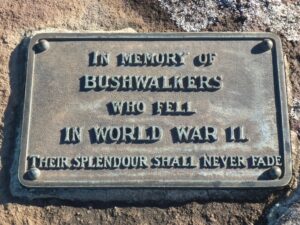ANZAC Day is not far off. Many bushwalkers will be heading to Splendour Rock in the Wild Dog Mountains of the Megalong Valley. They will be there to honour thirteen (13) bushwalkers remembered by a simple but moving Dawn Service at this memorial plaque. There has been an annual Dawn Service since at least from 1992 and perhaps even 1990 (records are incomplete). Prior to that time Dawn Services were infrequent but usually at significant anniversaries such as 10, 25 and 50 years since its dedication in 1948 by the NSW Federation of Bushwalking Clubs (now Bushwalking NSW)..
The Bushwalking NSW website has a file that describes the fallen we remember at Splendour Rock prepared by Michael Keats OAM, Belinda Keir and Keith Maxwell. See – https://www.bushwalkingnsw.org.au/history/
There is something special about Splendour Rock that has been hidden plain sight. Its not just the location which is very special with its stunning view of the southern Blue Mountains. It tells the story of a changing Australia in World War II.
In WWI Australia sent a new army, the AIF (Australian Imperial Force) to the other side of the world for an amphibious landing on ANZAC Day 1915 at Gallipoli.
Australia industrialised as war came very close in WWII and the casualties tell an interesting story. Among the bushwalkers remembered a minority were in the AIF but all four (4) died in the fall of Singapore in 1942 or later as POW of the Japanese.
Bruce Elder (pictured) of Coast & Mountain Walkers died on HMAS Sydney when it was lost off the Western Australian coast in November 1941.
James McCormack of YMCA Ramblers although in RAAF died on HMAS Canberra when it was lost in the Battle of Savo Island in the Pacific Ocean. Again, not Europe.
Norman Saill of Sydney Bush Walkers and RAAF died in the New Guinea campaign. The remaining six (6) bushwalkers (of the 13) were all in RAAF and died while based in the UK.
So, hiding in plain sight was the fact that at Splendour Rock more airmen (8) are remembered than soldiers (4) who were more likely to have died close to Australia and not in some foreign (European) field.

Splendour Rock Memorial 1948
Keith Maxwell.

Comments are closed.